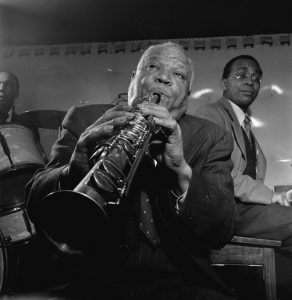Sidney Bechet
Perhaps no other jazz musician worked with as many of the genre’s early greats as Sidney Bechet. Bechet was a famous jazz clarinetist and soprano saxophone player born on May 14, 1897 in New Orleans, Louisiana. The Bechet family owned one clarinet, which was initially given to one of Sidney’s brothers. When Sidney began to steal his brother’s clarinet to play out on the porch at night at age six, his talent was enough to convince his parents to ask his older brother to let Sidney take the instrument1. In 1903, Sidney had already begun to publicly perform with his brothers, being reported to have played clarinet on Liberty Street near Hope’s Hall by Robert Goffin, a story corroborated by one of Sidney’s brothers. Sidney developed his musical skills playing locally with jazz artists such as Buddy Petit, Jack Carey, Joe “King” Oliver, Clarence Williams, Freddie Keppard, and perhaps most notably John Robichaux’s orchestra. Bechet became a member of the well-known Olympia Band, which was said to have routinely packed the Tulane Gymnasium. Bechet toured the South with Bruce and Bruce Stock Company in 1917.
Bechet moved to Chicago in 1918, and soon after to New York in 1919 after he was accepted into the Southern Syncopated Orchestra. During Bechet’s second year with the group, he toured Europe and became the first known jazz musician to receive praise from a classicist, a Swiss conductor by the name of Ernest Ansermet2.
This catalyzed the beginning of a new era of Bechet on the soprano saxophone, an instrument for which he would eventually become very well-known. Bechet worked with famous musicians such as Duke Ellington (a disciple of Bechet’s, Johnny Hodges, was Ellington’s principal alto saxophone soloist for over 40 years in the middle of the 20th century), James P. Johnson, Benny Payton, and Claude Hopkins. From 1928 to 1938, Bechet played occasionally with composer and conductor Noble Sissle’s band around the United States and Europe, taking time off to join the New Orleans Feetwarmers to tour in May of 1932.
Due to his incredible musicianship, Bechet paved the way for the national revival of the New Orleans jazz style beginning in 1939. Unfortunately, this revival was not compatible with Bechet’s music and his playing began to become out of vogue. Bechet continued to travel and perform with decreasing frequency and attention until permanently establishing himself in Paris in the late 1940s. Bechet would remain in Paris until his untimely death on his sixty-second birthday in 19593.

You must be logged in to post a comment.